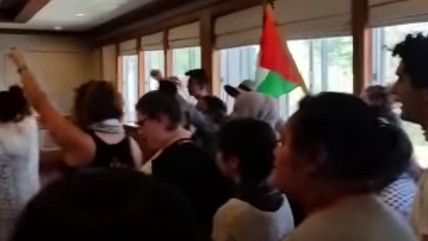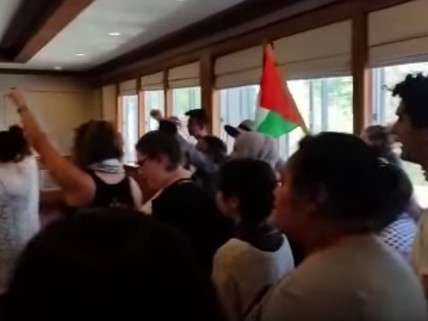Pro-Palestinian Activists Shout Down Jerusalem Mayor's Speech at San Francisco State University
Respect for free expression goes out the window when it comes to Israel/Palestine issues on college campuses.

When it comes to political activism regarding

Israel/Palestine on American college campuses, ideological combatants on both sides often fail to respect the right of those with whom they disagree to have their fair say.
Last month, the University of California (UC) voted to include anti-Zionism (broadly defined as opposition to the idea that Israel is the rightful national homeland of the Jewish people) as a form of banned "intolerant expression," and last week a bipartisan group of New York lawmakers demanded that the City University of New York (CUNY) ban the pro-Palestinian group Students for Justice in Palestine (SJP) from its campuses, alleging that SJP's activism had contributed to a climate of violence and intimidation against Jewish students.
In both instances, the evidence that pro-Palestinian political activism is responsible for violence is flimsy at best, but the consequence of such reactions is an environment on college campuses where the freedom to engage in robust and impassioned political speech is chilled.
But that doesn't mean pro-Palestinian activists always respect others' right to free expression. Just yesterday, activists "aligned" with SJP shouted down Jerusalem Mayor Nir Barkat's attempt to give a speech at San Francisco State University, where he made a stop on a brief tour of US college campuses sponsored by the Jewish student group, Hillel.
A member of Israeli Prime Minister Benjamin Netanyahu's right-wing Likud Party, Barkat supports a "united Jerusalem" in Israeli hands. Since Israelis and Palestinians both consider Jerusalem to be their capital, such a sentiment combined with the increase of Israeli settlements in the largely Arab neighborhoods of East Jerusalem are considered by many to be a huge impediment to the rebooting of any legitimate peace process.
A few minutes into his address, Barkat was forced to abandon the podium as SJP-affiliated protesters chanted things like "Free, Free Palestine," "From the river to the sea, Palestine will be free," and "Intifada!"
After the majority of the audience cleared out, Barkat sat among the few dozen students and teachers who remained and tried to resume his speech, while the activists congregated in the back of the room, continuing to shouting and chant in the hopes that even the truncated audience wouldn't be able to hear the speaker they came to see.
Aruta Sheva reports, "Campus and city police were called, yet they stood idly by, allowing the unruly protesters to drown out the mayor's address."
The mayor's support of a "united Jerusalem" deeply offends advocates of the Palestinian cause, but the idea that "Palestine" consists of the land "from the river to the sea" surely offends Israelis and their supporters, as the river to the sea encapsulates both the Palestinian territories and the state of Israel. Both sides can claim that each of these ideas de-legitimizes the rightful existence of the other.
Following yesterday's incident, San Francisco Hillel released a statement reading in part:
There is a concerning trend that college campuses are not spaces where diverse viewpoints are tolerated. Recently, we have seen acts of outright hostility and physical aggression when one person did not agree with the views of another on campus.
This characterization is true, but it is not confined to pro-Palestinian activism. As Reason's Robby Soave reported last December, the mere act of hanging a Palestinian flag in a dorm room window was deemed "disrespectful" to the George Washington University campus community, and the offending standard was ordered removed (watch an accompanying video report of this incident below).
Advocates on each side of this complicated and ongoing international crisis frequently push a self-identity of victimhood as a rationale for shutting down their adversaries' ability to be heard on college campuses.
But though their tactics differ, their intent dovetails quite often. The "other's" point of view is too dangerous to be considered, and must silenced.
